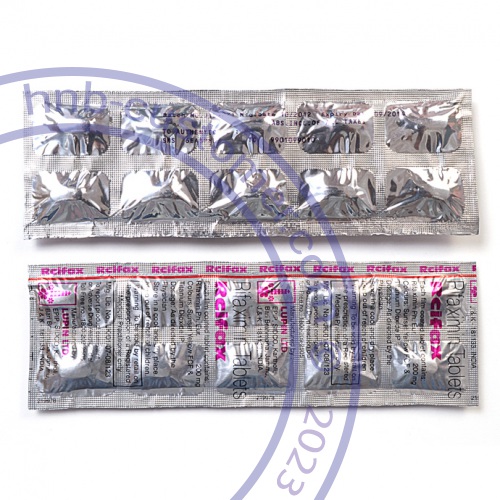

Brand(s):
- Rcifax
Manufacturer:
- Lupin Limited
Disease(s):
- Bacterial Infection / Liver Failure / Hepatic Encephalopathy / Diarrhea
- We can ship our products to any location worldwide
- Enjoy complete anonymity and robust data security measures
- Exclusive certified products at compelling prices
- Skip the hassle of long queues; get your medicines hassle-free
Xifaxan
rifaximin
| Package | Per tablet | Price | Savings | Order |
|---|---|---|---|---|
|
180 tablets
Free AirMail shipping
|
$ 1.25
|
$ 224.95 $ 1.25 Per tablet
|
$ 134.75
|
|
|
90 tablets
|
$ 1.50
|
$ 134.95 $ 1.50 Per tablet
|
$ 44.90
|
|
|
60 tablets
|
$ 1.75
|
$ 104.95 $ 1.75 Per tablet
|
$ 14.95
|
|
|
30 tablets
|
$ 2.00
|
$ 59.95 $ 2.00 Per tablet
|
|
| Package | Per tablet | Price | Savings | Order |
|---|---|---|---|---|
|
180 tablets
Free AirMail shipping
|
$ 2.33
|
$ 419.95 $ 2.33 Per tablet
|
$ 119.75
|
|
|
90 tablets
Free AirMail shipping
|
$ 2.50
|
$ 224.95 $ 2.50 Per tablet
|
$ 44.90
|
|
|
60 tablets
Free AirMail shipping
|
$ 2.67
|
$ 159.95 $ 2.67 Per tablet
|
$ 19.95
|
|
|
30 tablets
|
$ 3.00
|
$ 89.95 $ 3.00 Per tablet
|
|


Brand(s):
- Rcifax
Manufacturer:
- Lupin Limited
Disease(s):
- Bacterial Infection / Liver Failure / Hepatic Encephalopathy / Diarrhea
Rifaximin Tablets
What is Rifaximin?
Rifaximin is an antibiotic specifically designed to target and fight bacterial infections within the intestines. Unlike many antibiotics that circulate throughout the body, rifaximin's effects are primarily localized to the digestive tract.
It's commonly used to treat traveler's diarrhea caused by E. coli in adults and children 12 years and older. This type of diarrhea often results from consuming contaminated food or water.
Rifaximin also plays a role in managing hepatic encephalopathy (HE) in adults with liver failure. HE occurs when the liver's impaired function allows toxic substances to build up in the body, affecting brain function. Rifaximin helps to reduce these toxins in the gut, lessening the impact on the brain.
Important Information to Share with Your Doctor Before Taking Rifaximin
You shouldn't take Rifaximin if you're allergic to rifaximin or similar medications like rifabutin (Mycobutin), rifampin (Rifater, Rifadin, Rifamate), or rifapentine (Priftin).
Certain health conditions might require a dose adjustment or additional monitoring while using Rifaximin. These include:
- Severe liver disease
- Diarrhea accompanied by a fever
- Watery or bloody diarrhea
Rifaximin is categorized as FDA pregnancy category C. This means the potential risks to a developing fetus aren't fully understood. Pregnant women or those planning pregnancy should discuss Rifaximin use with their doctor. Similarly, breastfeeding mothers should consult their doctor before using Rifaximin, as it's unclear whether it passes into breast milk and its potential effects on the nursing infant.
How to Take Rifaximin
Always follow your doctor's instructions precisely. Do not alter the dosage or duration of treatment without consulting your physician. The prescription label provides crucial guidance.
Rifaximin can be taken with or without food.
Complete the entire course of treatment as prescribed, even if your symptoms improve before the medication is finished. Stopping early may allow the infection to return. Rifaximin is ineffective against viral infections (like the common cold or flu) or viral diarrhea. If your symptoms worsen or don't improve after 24 hours, contact your doctor immediately. It’s also important to remember that Rifaximin isn't effective against all types of bacterial traveler's diarrhea.
What to Do if You Miss a Dose
Take the missed dose as soon as you remember, unless it's nearly time for your next dose. In that case, skip the missed dose and continue with your regular schedule. Never double up on doses to compensate for a missed one.
Monitoring While Taking Rifaximin
Antibiotics, including Rifaximin, can sometimes cause diarrhea, which might indicate a new infection. If you experience watery or bloody diarrhea, discontinue Rifaximin and contact your doctor promptly. Avoid using anti-diarrheal medications unless specifically instructed by your doctor.
Possible Side Effects
Seek immediate medical attention if you experience any signs of an allergic reaction, such as hives, difficulty breathing, or swelling of the face, lips, tongue, or throat. Stop taking Rifaximin and consult your doctor immediately if you develop a fever or watery/bloody diarrhea.
Less serious side effects are more common and may include:
- Bloating, gas, stomach pain
- Urgency to have a bowel movement
- Feeling of incomplete bowel emptying
- Nausea, vomiting, constipation
- Headache, dizziness
- Fatigue
- Swelling in the hands, feet, or torso
Potential Drug Interactions
Many medications can interact with Rifaximin. Inform your doctor about all medications you're taking, including prescription drugs, over-the-counter medications, vitamins, and herbal supplements. Do not start any new medications without your doctor's knowledge.
Rifaximin Storage
Store Rifaximin at room temperature, away from moisture and heat.
```









